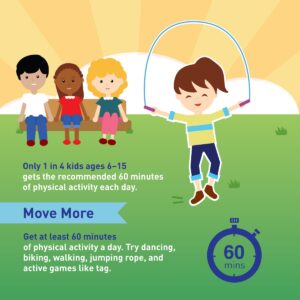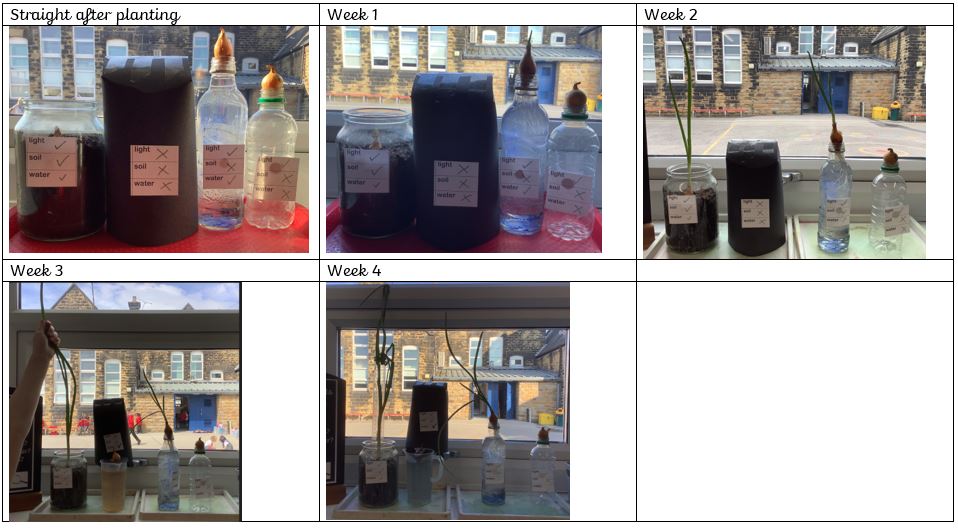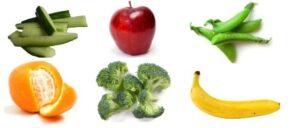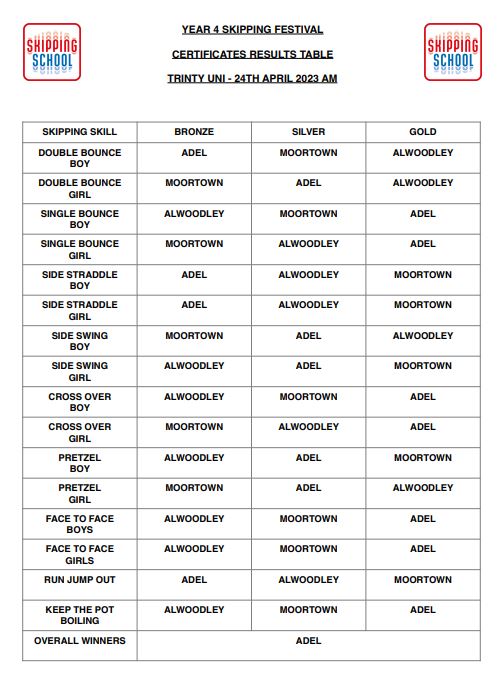There has been another great sporting achievement from one of our Y5 friends.
Last week, they took part in the Leeds and Bradford Triathlon club’s junior aquathlon at Leeds University campus. This involved a 150m swim and a 1200m run.

There has been another great sporting achievement from one of our Y5 friends.
Last week, they took part in the Leeds and Bradford Triathlon club’s junior aquathlon at Leeds University campus. This involved a 150m swim and a 1200m run.

Our latest Living and Learning sessions have been all about the importance of exercise and how we need to keep active to keep our bodies and our minds healthy.
We thought about all the things we had done since waking up. Then, we checked which ones were active.
Practised gymnastics
Wake up Shake up
Walking to school
Playing tig with friends at playtime
Classroom skipping brain break
Pull ups
The NHS guidance states that children and young people should ‘aim for an average of at least 60 minutes (30 minutes in school and 30 minutes out of school) of moderate or vigorous intensity physical activity a day across the week’. We know that the exercise we need to do to achieve this, should increase our heart rate.
We thought about how we manage to achieve our 30 minutes during the school day.

Help at home – try a new physical activity out of school – maybe a local Junior park run, local cricket lessons or tennis lessons. Practice some skipping ready for our skipping festival.
This half-term, we’re biologists, learning specifically about plants.
Here’s a list of key words that we’ve been learning as part of our topic.
seed: the part of a plant which can grow into a new plant
bulbs: the round underground part of a plant that contains food for the plant (eg onion bulb, daffodil bulb, tulip bulb)
basic needs: the things that a plant needs to live
temperature: a measurement of how hot or cold something is
growth: an increase in size
healthy: feeling well and happy
germinate: when a seed begins to grow into a plant
seedling: a young plant grown from a seed
Throughout this learning, we have been carrying two investigations.
How do bulbs grow? What do plants need to help them grow?
We put some onion bulbs in different conditions and observed the changes over time.

Ask your child to explain what had happened.
What do seeds need to germinate?
After observing and comparing different seeds, we planted seeds in different locations (and therefore different conditions). All the plants were given water.

Week 1

After one week, this is what had happened. The seeds had germinated in two out of the three locations. Even though the seedlings had started to grow in the cupboard and the classroom, they looked different and we observed these differences.

After two weeks, we were surprised to see that the seeds in the fridge had started to germinate. There were only small seedlings and they looked pale and not very healthy. The seedlings in the classroom on the window sill were definitely looking the healthiest with lots of dark green leaves.
We’ve also noticed a change in the tree in the front playground. How has it changed?

Help at home this week, the children have taken home their own planted sunflower seed to look after. Read the instructions to help the plant to grow as best as it can. We’d love to see how the plants are getting on!
City of Leeds Basketball, who provide our after-school basketball clubs, have a range of sessions for children of all ages.
Visit their website to book.

Our latest Living and Learning theme has been all about healthy eating.
This video helps to explain the importance of healthy eating as part of living healthily. The Eatwell Guide is a key document to show how much of what we eat overall should come from each food group to achieve a healthy, balanced diet. The bigger the section the more food from that group we should eat. The balance of foods from each group does not need to be achieved with every meal but we should aim for the balance over a day or even a week.
We used the Eatwell Guide as part of our reading fluency text too.

In our next Living and Learning session, we thought about the 5 a day message. Having at least 5 (ideally different) portions of fruit and vegetables keeps us healthy. These could be different types of fruit and vegetables.
 A portion is about a handful.
A portion is about a handful.

Here were some tips for achieving your 5 a day.
You could have some banana on your cereal.
If you put some cucumber in your sandwich, that would be an extra portion.
You could add some sweetcorn or peas to your pasta for tea.
Have some fruit or vegetable sticks when you get home from school.
We also thought about our recent design and technology food preparation of overnight oats and how we used a variety of fruits (frozen, tinned, fresh and dried) in that recipe.
Help at home look at the Eatwell guide together and think about any improvements that could be made. This may be having an extra vegetable a day, trying a new fruit or vegetable, switching to brown bread or pasta or having a healthier snack after school.
More healthy eating ideas can be found by signing up to these Healthy Steps emails from Better Health (formally Change4Life).
We continue to award learning at home certificates every Tuesday for Lexia, Numbots and Times Tables Rock Stars. These are for achievement and effort.
Congratulations to the eleven children who have achieved their Level 9 (end of Year 2 learning) certificate for Lexia and the additional five children who are working on Level 9 currently.
For those children working towards Level 9, please continue to work on Lexia at home (little and often is best!).
In our latest learning about ‘healthy me’ we thought about what a healthy person would be like.
Healthy = keeping your body working at its best.

Being safe in the sun is one way we can keep our body healthy and this reading fluency text helped us to understand why this is important.

We’ve also been thinking about the importance of sleep.
Sleep helps your body work and can help you get better if you don’t feel well.
If you don’t have enough sleep, you feel grumpy, you can’t focus and you can’t control yourself.
If you have a busy brain it can be hard to get to sleep.
We thought about the things that can help you get to sleep.
Sometimes, things can stop you getting to sleep.
Help at home: ask your child what the three key sun safety messages are.
Have a look together at these sleep tips for children.
Here are the final results from the Year 4 skipping festival this week.

The Skipping School programme (for Year 2 and Year 4) is one of the ways we invest our PE Premium so we always like to check if the investment was worthwhile for the children.
Pupil feedback
I learnt lots of new skips. Now I can do fancy footwork and at first I had no clue what to do!
I enjoyed the skipping festival because we got to have a little bit of competition and skipping is great exercise.
I couldn’t do side straddle and now I have learnt how to do it.
I learnt different skips and I had a really good time at the festival.
I really enjoyed it because of all the new things I learnt.
It was good to do skipping in PE as well as other sports.
I learnt to have fun whilst exercising and winning doesn’t matter. Taking part was important.
Parent feedback
My son thoroughly enjoyed this event. He doesn’t normally do PE competitions so it was really good for the whole class to go. He was so proud of his two certificates.
Organiser feedback
Your Year 4s did an amazing job at the festival this morning.
Wednesday 21st June is the date for our Year 2 skipping festival. It will take place at Leeds Trinity University and more details will be sent out shortly.
We are doing lots of practising at school and ropes are still available to buy (£3 at the office) to keep improving those skills at home.
A huge well done to our star Year 6 star runner who, after finishing 1st place in the Leeds final, represented Leeds today in the rearranged West Yorkshire Final at Temple Newsam. He ran a fantastic race and finished in a very impressive 6th place out of a very large field. What a great achievement!




